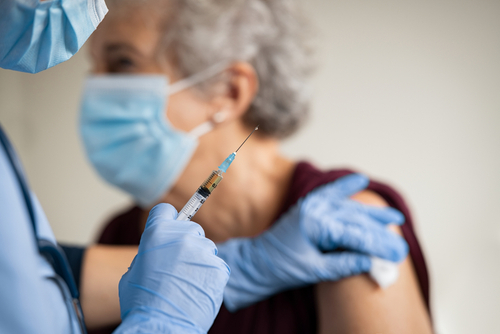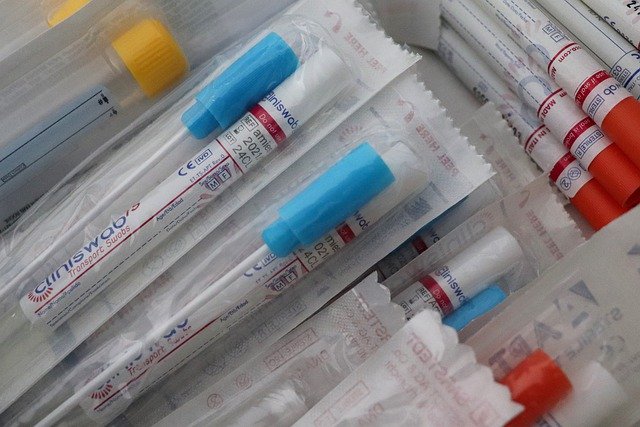How unlocking health data shaped the COVID-19 vaccine rollout
6 October 2021

In December 2020, the Pfizer-BioNTech and Oxford-AstraZeneca vaccines against COVID-19 were approved for use in the UK. While these vaccines had been thoroughly tested in clinical trials involving tens of thousands of people, it was vital to understand how they performed in the wider population.
Some groups of people due to receive the vaccines, such as the most elderly, were not included in the trials and may have had a weakened immune response. In addition, rare side effects may only become apparent when the vaccines are given to millions of people.
These concerns could only be addressed by examining large data collections, which have historically been difficult to access and study. The unprecedented speed of the vaccine development and rollout meant that researchers needed to act quickly for their work to inform public policy.
Health Data Research UK (HDR UK) has been working to make these datasets accessible to researchers since before the pandemic. The infrastructure and collaborations put in place meant that UK researchers were well-placed to quickly help policymakers and the public understand the benefits and risks of the COVID-19 vaccines.
Vaccine efficacy
Just two months after the vaccine rollout began in the UK, these efforts led to the first real-world data on single-dose vaccine effectiveness. This work was led by the BREATHE Health Data Research Hub, which created a national data infrastructure that linked vaccination, primary care, COVID-19 testing, hospitalisation and mortality records for 99% of the Scottish population.
These results showed the high protection offered by the Oxford-AstraZeneca and Pfizer-BioNTech vaccines after a single dose, even for people over 80, and provided confidence in the continuing UK rollout. This work also influenced national regulatory strategy in Canada, Denmark, France and Germany.
Vaccine side effects
A research study carried out by HDR UK through the Data and Connectivity National Core Study showed that there was indeed a slightly increased risk of specific blood clotting disorders after a first dose of the Oxford-AstraZeneca and Pfizer-BioNTech vaccines. However, the data also showed that risk was substantially higher and prolonged after contracting COVID-19.
Even with unprecedented access to data, there is still more to be done. Time lags in hospital admission data and a lack of linked laboratory data at a national level limited the analysis of vaccine side effects. A multi-regional group from the Data and Connectivity study is now trialling ways to provide more timely and additional information on background rates of these side effects. If successful, this approach could be scaled up across the UK and help to address other important research questions on vaccine safety and effectiveness.
Vaccine uptake
In order to achieve maximum coverage through the rollout, it became increasingly important to understand the issues behind vaccine hesitancy.
HDR UK jointly commissioned research to use data from the Office for National Statistics to identify inequalities in COVID-19 vaccination rates in England for the over 70s. This demonstrated that people of black African and black Caribbean ethnic backgrounds are five times more likely to be unvaccinated than the white British group.
This study also found that factors that increase the risk from the virus also make people less likely to be vaccinated, including deprivation, disability, older age and household composition.
Making data accessible
These research advances and many others have only been possible due to work quietly happening in the background to make the data available.
One key challenge is that many researchers do not know what datasets exist. So, in 2020, we launched the Health Data Research Innovation Gateway, offering a single “front-door” to discover UK health data for the first time. The Gateway has been a key enabler in responding to COVID-19 by providing the research community with a unified platform to discover and request access to datasets relevant to the pandemic. Today, there are over 93 datasets that have been made available for urgent research into COVID-19 and 3,838 searches for COVID-19 datasets on the Gateway.
Working in partnership with NHS Digital and the British Heart Foundation (BHF) Data Science Centre, we created a new linked health data resource covering over 96% of the English population. This resource created linked data from primary and secondary care, registered deaths, COVID-19 laboratory and vaccination data, and cardiovascular specialist audits. This has led to further insights on vaccine safety developed by the CVD (‘Cardiovascular disease’)-COVID-UK consortium, a collaborative research group led by the BHF Data Science Centre at HDR UK.
What happens next?
While the COVID-19 vaccines themselves have thus far been rolled out well in the UK, there remain research questions which will continue to emphasise the importance of data, including the impact of variants on vaccine effectiveness (making use of genomic sequencing) and to inform strategies for booster jabs.
A special group convened by HDR UK will continue to bring together lead researchers and policy organisations, including Public Health England and the Medicines and Healthcare products Regulatory Agency. This group meets every fortnight to review these questions and the suggest the national responses, for example, reviewing the approach to enable rapid, acute admissions data at regional level to further support vaccine safety research.
Beyond COVID-19 vaccines, linked datasets from across the UK’s rich health data ecosystem being made securely available to researchers could help to improve care for many other life-threatening conditions, such as cancer, diabetes and cardiovascular disease. Although the advances made here were provoked by a global crisis, they have clearly demonstrated what can be achieved through the power of data.
Key research on COVID-19 vaccine safety and effectiveness enabled by Health Data Research UK:
- Risk of thrombocytopenia and thromboembolism after covid-19 vaccination and SARS-CoV-2 positive testing: self-controlled case series study
- Sociodemographic inequality in COVID-19 vaccination coverage amongst elderly adults in England: a national linked data study
- Association of COVID-19 vaccines ChAdOx1 and BNT162b2 with major venous, arterial, and thrombocytopenic events: whole population cohort study in 46 million adults in England
- Risk prediction of covid-19 related death and hospital admission in adults after covid-19 vaccination: national prospective cohort study
- Impact of Delta on viral burden and vaccine effectiveness against new SARS-CoV-2 infections in the UK
This article was updated in October 2023 to remove reference to a public survey data that could not be verified as part of a detailed independent review. HDR UK apologises to readers.



